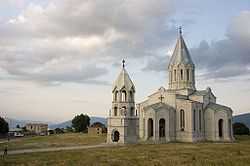Lower Bethlehemi Church
| Church of Saint Stepanos of the Holy Virgins Կուսանաց Սուրբ Ստեփանոս վանք ქვემო ბეთლემის ეკლესია | |
|---|---|
 | |
| Basic information | |
| Location | Old Tbilisi, Georgia |
| Geographic coordinates | 41°41′21″N 44°48′04″E / 41.689230°N 44.801091°ECoordinates: 41°41′21″N 44°48′04″E / 41.689230°N 44.801091°E |
| Affiliation | Georgian Orthodox Church |
| Architectural description | |
| Architectural style | Armenian |
| Completed | 1868–1870 |
The Lower Bethlemi Church(Georgian: ქვემო ბეთლემის ეკლესია), also known as the Church of Saint Stepanos of the Holy Virgins (Armenian: Կուսանաց Սուրբ Ստեփանոս վանք) or Koosanats Sourb Stepanos Vank[1]) – is a 14th–19th-century church at the foot of Narikala fortress in Old Tbilisi, Georgia.[2] It was rebuilt between 1868 and 1870 [1] and operated as an Armenian church. In 1988 it was given to the Georgian Orthodox[3] and its Armenian identity was "Georgianized" in 1991.[1]
Georgian appropriation
From 1989 to 1995, the church underwent a heavy process of "Georganization", during which time all evidence of Armenian religious iconography was destroyed or removed and was replaced with Georgian ones.[4]
The alterations to remove the church's original Armenian characteristics included:[4]
- the destruction of the ground floor portal and mausoleum of Mother-Superior Peprone in 1990
- the removal of the iron gratings of the windows and the covering of windows with bricks in 1995
- the removal of Armenian high-reliefs stretching all around the drum of the church from 1991–1993
- the destruction on the top of the western pediment of the church (blown up on February 9, 1990)
- the destruction of the marble Armenian "khachkal" in the middle of the apse in 1990
- the removal of a marble cross, altar stone, and other fragments for safe-keeping at the Cathedral of Saint Gevorg in 1990
- the razing of the high altar and khachkal (1990–1991)
- the destruction of the baptistery font which had been in the northern wall
- the removal of the marble washing-basin (1870) and taken to safe-keeping at Saint Gevorg
- the destruction of the Armenian inscription on the interior of the drum that recounts the repairs of the cupola roof
- the removal of the Armenian inscription from 1870 that recounting the erection of the column with deaconess Hripsime Begtabeguiantz's means (removed in 1991)
- the removal of a marble inscription slab (1870) recounting deaconess Katarine Yerkainabazouk-Arghoutiantz's construction activity removed in 1990)
- the removal of the marble inscription slab which recounts the construction of activity of the Ourdoubekiantz couple (disappeared in 1990)
- the removal of the marble inscription slab recounting the construction of the upper floor of the church
- the removal of the inscription specifying that the metal spiral stairs leading to the upper floor were built in 1885 on the initiative and means of arch-deaconess Evpimia Behboutiantz
- the throwing away of other Armenian lapidary inscriptions during the abolition of the Armenian characteristics of the church between 1990–1991
- the removal and destruction of the memorial inscription carved on a marble slab on the wall of Mother-Superior Heprosime Abamelikian's burial vault under the portal in front of the northern entrance of the church (the mausoleum was also destroyed) in 1990
- A painting in the style of a Georgian fresco was placed on the tympanum of the altered northern entrance in June 1995
Gallery
-

View of Saint Stepano (far right) and two other Armenian churches in Old Tbilisi: Holy Mother of God (Bethlehem) (middle) and Saint George (far left)
-
.jpg)
Another view of the Armenian Quarter with Saint Stepanos Church (right of center)
See also
- Saint Bethlehem Armenian Church, a nearby 18th century Armenian church
- Saint Gevorg of Mughni Church, a nearby 13th century Armenian church
- Cathedral of Saint George, a nearby 13th century Armenian church
- Holy Mother of God (Norashen) Church, a nearby 15th century Armenian church
- Armenians in Georgia
References
- ↑ 1.0 1.1 1.2 "Koosanats Sourb Stepanos (St. Stepanos of the Holy Virgins) Church, Tbilisi". Research on Armenian Architecture. Retrieved 15 July 2009.
- ↑ Thierry, Jean-Michel (1989). Armenian Art. New York: Harry N. Abrams. p. 586. ISBN 0-8109-0625-2.
- ↑ "Tbilisi Explorer: Lower Bethlehem". City of Tbilisi, Georgia. Retrieved 15 July 2009.
- ↑ 4.0 4.1 Karapetyan, Samvel (1998), The State Policy of Georgia and the Monuments of Armenian Culture (1988-1998) (in Armenian) (1st ed.), Yerevan: Research on Armenian Architecture, pp. XIII–XX, ISBN 5-8080-0144-7
| ||||||||||||||||
| |||||||||||||||||||||||||||||||||||||||||||||
| ||||||||||||||||||||||||||||||||||||||




.jpg)
